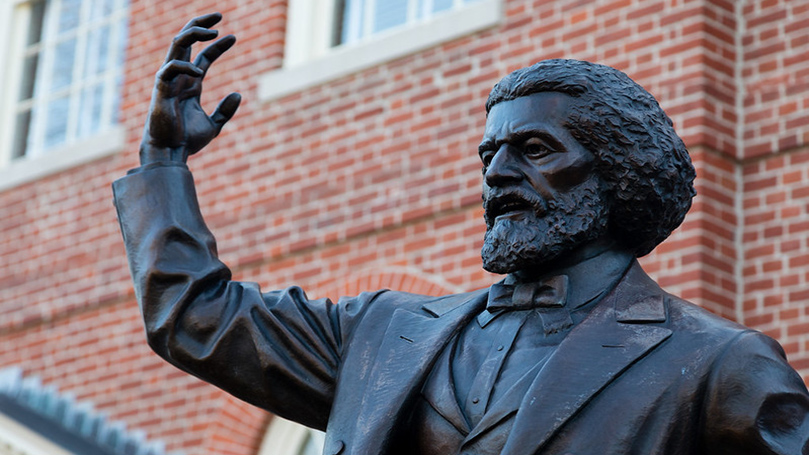
In the video below are the descendants of Frederick Douglass, 168 years later, reading from his famous 1852 Fourth of July Speech. In 1852, the slaveholders were becoming more aggressive in seeking to expand their brutal system. The speech deserves to be seen as the most important Fourth of July speech in the history of the U.S. republic. Believing that the anti-slavery movement and the revolutionary Civil War would make emancipation real, Douglass stated in other Fourth of July speeches that “your (white) forefathers” and “our (Black) forefathers” would live and work together in a new democratic republic.
Frederick Douglass was born a slave in Maryland, separated from his mother as an infant, raised by his grandmother until the age of six, and then sent off to another slaveholder family. Douglass was “lucky” in the sense that he was to be a house slave rather than a plantation slave under the heel of overseers and slave drivers. The wife of his owner taught him to read, and he developed an insatiable desire to learn. By the age of 12 he had stumbled upon a book that dealt with liberty and the rights of man. Later he was “hired out” by his owners to a larger slaveholder and began to teach illiterate slaves to read, using the Bible as a text. He also began to plan his escape from slavery. The local slaveholders felt threatened by his attempts to teach slaves to read (this was a few years after the Nat Turner slave rebellion). They broke into one of Douglass’s classes with clubs and brutally beat Douglass and the slaves whom he was teaching. Douglass was returned to his owners where the husband of the woman who had taught him to read began to whip him regularly for his “crime” of seeking to educate his fellow slaves.
He would finally escape in 1837, become an abolitionist activist, and found an abolitionist newspaper, the North Star. He toured for the abolitionist cause in Ireland and Britain, while many of his fellow abolitionists feared that his former owner would seek to get him back, particularly after the passage of the Fugitive Slave Act as part of the “Compromise” of 1850.
Always living without much money, seeking to keep his newspaper alive, Douglass accepted an invitation from the Ladies Anti-Slavery Society of Rochester, New York, to speak on the Fourth of July. While women did not have the right to vote and were very much second-class citizens under the law, they played an important part in the anti-slavery movement.
Douglass chose to speak on July 5th. Harriet Beecher Stowe’s anti-slavery novel, Uncle Tom’s Cabin, which would become the most important and influential political novel in U.S. history, had been published a few months before. The speech would become important to the history of the United States because the abolitionist movement, serving as the vanguard of a larger anti-slavery coalition, would make it important.
This reading should be seen as a Fourth of July answer to Donald Trump, who, if living in 1852 would be praising the Fugitive Slave Act, claiming that the slaves were better off than the poor whites, and freeing them would make them competitors with the poor whites (arguments made by defenders of slavery).
Douglass and his fellow abolitionists, if they heard Trump, would see him as a “Know Nothing,” an adherent of the anti-immigration, nativist, and anti-Catholic movement. A few years later, when Douglass and his fellow abolitionists rallied to support the new anti-slavery Republican Party to challenge the Democrats, the Know Nothings formed their own party, which they called the American Party, and nominated former President Millard Fillmore, who had signed the Fugitive Slave Act. The election was touch and go, but the Republicans ran second and the Know Nothings faded. At the time, a former Whig congressman, who would soon join the new Republican Party, Abraham Lincoln, wrote to a friend that if the Know Nothings won the election he would think of going to a country which did not pretend that it stood for freedom and democracy—czarist Russia. One can imagine what Lincoln would say today if he heard Donald Trump.
Image: Chesapeake Bay Program, Creative Commons (BY-SA 2.0).


 Join Now
Join Now